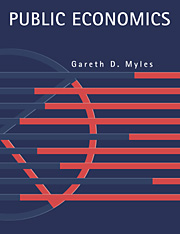Book contents
8 - Corporate taxation
Published online by Cambridge University Press: 05 June 2012
Summary
INTRODUCTION
The corporation is treated as a separate entity for tax purposes in all developed countries. It has been subject to numerous tax instruments with a variety of different motivations. The transfers between the corporation and its stockholders result in the behaviour of the corporation also being influenced by the structure of the personal tax system, most notably through the favourable tax treatment of capital gains. The intention of this chapter is to describe the relevant tax instruments and to determine their effects. This will give an insight into the many issues that arise in the analysis of corporate taxation.
This chapter is distinguished from those that precede it by its focus upon the effects of taxation rather than upon optimisation exercises. There are several reasons for this. Input taxes have often been employed in many countries and the effects of such taxes are important because of this, but it has already been shown that they would not form part of an optimal tax system for a competitive economy. Therefore there is no need for a further study of optimisation. In simple settings where shareholders exercise direct control, the corporation cannot be identified as an entity distinct from its owners. A coherent tax structure would then involve a comprehensive income tax on owners, covering all sources of earnings, with no need for separate taxation of the corporation. Although the effects of corporation taxation are still of interest in such a framework since they suggest issues that may arise in more complex settings, optimisation is again of limited interest.
- Type
- Chapter
- Information
- Public Economics , pp. 231 - 260Publisher: Cambridge University PressPrint publication year: 1995



